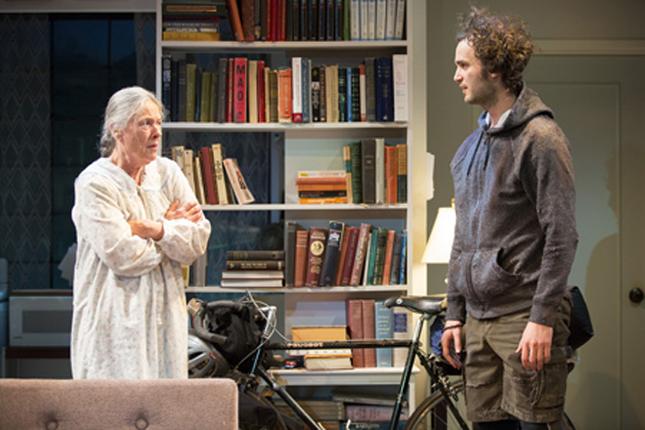Studio’s ‘4000 Miles’: at Home with Vera and Leo
By • April 10, 2013 0 1836

The Studio Theatre production of “4000 Miles,” the play by gifted and buzzed-about playwright Amy Herzog opens suddenly, like a revelation in the middle of the night.
We see Vera, the 91-year-old, card-carrying Communist and self-described lefty Vera open the door to her Greenwich Village apartment to encounter her grandson Leo, holding his bike, almost buried in packs of all sorts. “Hi, grandma,” he says, and she holds her hand over her mouth, mumbles incoherently, then rushes into the bathroom to put in her false teeth.
The moment is startling, sudden, discomfiting, funny, revealing, and most of all, immersive. We are in the play as quickly as a fish thrown into water, and we are in for it. Director Joy Zinoman, the founder of the Studio Theatre in her first directorial stint here since retiring in 2010, keeps things moving and punchy, but also often patient in scene after scene, bringing to light the play’s situation and secrets almost organically and without an ounce of sentiment. You laugh often—because often the play is very funny—but you never come close to that instant gratification of a budding lump in the throat. Here’s the thing, though: you won’t forget Vera and Leo, not for a long time.
“4000 Miles” could have been a lot of things—a battle-of-the-not-understanding generations or a comedy built around the same thing, a painful pastoral about growing and being old, a wise and touching play about basic, truthful communication in the age of instant communication. It’s all of these, to some extent, but also something entirely different.
The situation—and it is a situation that comes to a head but not an explosion—is fairly straightforward: Leo has arrived at his aging grandma’s place in New York after bicycling across the country from Portland, Oregon, a journey marked by a tragedy that eventually reveals itself. He is of an age—and as Grant Harrison plays him—a young “hippie sort” with tousled black hair and charm and charisma which he throws around almost carelessly but also as a potent defense mechanism. He’s plunked himself and his worldly belongings on grandma’s floor and ends up staying awhile. Vera a widower, lives by herself, insistently independent in her ways, but also aware that she’s losing her powers. She is forgetful and says, “There’s this trouble with words, I can’t find them.” She’s also gruff, unsentimental, hurtfully direct, a widow who knows how to hold a grudge in reserve. She has a friend across the hall with whom she rotates “check-to-see-you-haven’t died” phone calls but never sees.
This could be cute, even cloying, but it never gets close to that. Leo may be a charmer but you can see his painful self absorption, and for lack of a better word, careless cruelty at times. Tana Hicken’s portrait of Vera is hardly sweet—it’s sweet and sour, and that mixture makes her difficult, fascinating, and most important, sometimes brutally honest. “You stink,” she says to Leo when first appears. Then, with great affection folds his clothes that she’s washed for him while he’s asleep. They shares an affinity for Karl Marx and leftist dogma—her apartment is a veritable used bookstore in full flower, and you recognize a thick biography of “MAO” on one of the shelves.
Hicken shows off Vera’s frailty as if she were not afraid to be naked. It leaves her uncertain about what’s happening. Did she lock the top lock? Did she lose her checkbook or hearing aid? She still has her intellectual smarts, her ability to observe, and give love—grudgingly at times, but you know there’s more where that came from. Vera is another full-bodied portrait of vivid older women that include Miss Helen in Athol Fugard’s “Road to Mecca” (at Studio with Zimmerman directing) and grandma in “Lost in Yonkers” at Theater J.
Herzog as a playwright shares some qualities with another current “hot” playwright (and Studio favorite) Annie Baker. Her approach to characters and story-telling and narrative is often deflective, like a game of pong: secrets will out but they often do it by way of a side trip to the alley and a back-door entrance. So we learn Leo’s secrets: he’s not close to his mother, too close to his adopted sister and on the cross-country trip his best friend Mica was killed in a horrific accident. But the secrets come out in accidental silence.
The small cast—it includes Heather Haney in an insistently honest portrayal of Leo’s girlfriend Bec and Annie Chang as Amanda, on a disastrous pickup date interrupted by guess who—is altogether excellent, made more vivid by the lived-in, book-rich set and intimate theater setting. In the end, we and Leo and Vera, are left, not with the overused commodity of hope, but with a soothing appraisal of sad laughter.
- Tana Hicken (Vera) and Grant Harrison (Leo) in “4000 Miles | Garrett Faulkner
- Garrett Faulkner




